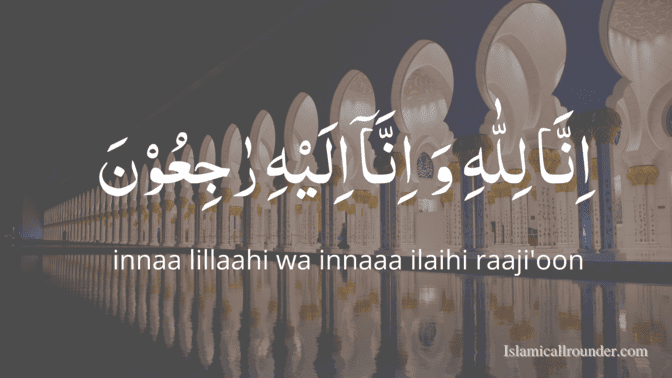Muslims usually recite this prayer “Innalillahiwainnailaihirojiun” when they hear of someone’s death. Many will not even know the meaning of this verse, although there are clear signs of God’s wisdom in this blessed verse and it comforts the bereaved.
It describes the submission and consent between the servant and God. The Holy Prophet used to seek mercy and help through this verse. In Surah Al-Baqarah, Allah says:
They say whenever there is trouble. ‘Indeed, to Allah we belong and to Him we shall return.
This verse is also recited with difficulty and also to avoid going astray. This is the usual duty of the scholars. They read a lot to save themselves from rebellion. Especially those who are anxious to find the lost things. If you start whispering due to panic during exams or any interview, then you should recite.
Innalillahiwainnailaihirojiun Meaning
It means to say ” innaa lillaahi “.I confess that we, our families are all servants of Allah Almighty, our wealth and everything belongs to Allah Almighty.
And to say wa innaa ilaihi raaji’oon means that I acknowledge that we are all about to return to Allah Almighty, first we will die, then we will be resurrected from the graves.
What is Innalillahiwainnailaihirojiun?
- Definition: Innalillahiwainnailaihirojiun, often abbreviated as Innalillah, is an Arabic phrase derived from the Quran. It translates to “Verily, to Allah, we belong and to Him we shall return.”
- Significance: This phrase is recited by Muslims upon hearing news of death as an expression of submission to the will of Allah and acknowledgment of the temporary nature of life on Earth.
The Importance of Innalillahiwainnailaihirojiun
- Spiritual Reminder: Innalillah serves as a reminder of the transient nature of worldly life and the ultimate return to the Creator.
- Comfort in Grief: Reciting this phrase brings solace and comfort to the bereaved, reminding them of Allah’s mercy and sovereignty.
Islamic Mourning Practices
- Recitation: Upon hearing of a death, Muslims immediately utter Innalillahiwainnailaihirojiun as a reflexive response, acknowledging Allah’s decree.
- This practice is deeply rooted in Islamic tradition and serves as a reminder of the inevitability of death.
- Patience and Perseverance: Following the recitation of Innalillah, Muslims are encouraged to demonstrate patience and perseverance in the face of grief.
- This patience is not passive acceptance but an active acknowledgment of Allah’s wisdom and mercy.
Impact of Innalillahiwainnailaihirojiun in Modern Society
- Social Support: In moments of loss, the recitation of Innalillahiwainnailaihirojiun serves as a unifying ritual, bringing communities together to support the bereaved.
- This communal support system plays a crucial role in easing the burden of grief and facilitating healing.
- Reflection and Contemplation: Innalillahiwainnailaihirojiun prompts individuals to reflect on the transient nature of life and prioritize spiritual growth over worldly pursuits.
Innalillahiwainnailaihirojiun in Arabic

Innalillahiwainnailaihirojiun in Urdu

Innalillahiwainnailaihirojiun Importance
- If you read on the occasion of sufferings and afflictions and hardships, then you get the special blessings, kindness and guidance of Allah Almighty.
- A Muslim who is afflicted with a calamity and remembers that calamity after a long time has passed.
- And if he recites at that time ” innalillahiwainnailaihirojiun” then Allah will reward him.
- The Holy Prophet says: Those who recite ” innalillahiwainnailaihirojiun ” in times of trouble Allah Almighty compensates him for his loss, and improves his outcome. And bestows upon him the best reward which makes him happy.
- The Holy Prophet says: My ummah has been given something which has not been given to any of the ummah and that is to say in the time of trouble, “I am Allah and I am to Him I will return”.
- The Holy Prophet says: There will be four kinds of people in the holy gardens of Paradise: one who holds on to “La ilaha illa Allah” without any doubt, the other who is happy to do good deeds and praises Allah Almighty for that (success of good deeds).
- The third is the one who becomes sad and asks for forgiveness when he commits a sin, and the fourth is the one who recites “ innalillahiwainnailaihirojiun” on the calamity.
- Hazrat Anas narrates: Whoever goes to the graveyard and recites Surah Yaseen (to reward the dead), Allah will reduce his sins on the Day of Qayamat.
- Hazrat Ali ibn Abi Talib says that Hazrat Muhammad (PBUH) said: Whoever passed through the graves and recited Surah Al-Ikhlas eleven times and rewarded the dead, he will be rewarded according to the number of those who died.
- Hazrat Sufyan ibn Uyyina narrates that it was said about the dead that the living need food More than that, the dead need prayer.
- Imam Ash’ari said: “And in our opinion it is permissible for the Muslim dead to give alms and pray for them, and we believe that Allah will reward them for their (good deeds).
- Imam Tahawi (may Allah have mercy on him) says in Aqeedah Tahawiyyah: “For those (who have departed from this world) the prayers and alms of living people are beneficial.
Frequently Asked Questions
Q: What is the appropriate response upon hearing Innalillahiwainnailaihirojiun?
A: Muslims respond to Innalillah with “May Allah have mercy on the deceased” or “Indeed, we belong to Allah and to Him we shall return.”
Q: Can Innalillahiwainnailaihirojiun be recited for non-Muslims?
A: While the phrase holds specific religious significance in Islam, its essence of acknowledging the temporary nature of life can be appreciated by people of all faiths.
Conclusion
Innalillahiwainnailaihirojiun encapsulates the core tenets of the Islamic faith and serves as a profound reminder of life’s transience and the ultimate return to Allah. Understanding its significance and incorporating it into our lives allows us to find solace in grief and deepen our spiritual connection.
